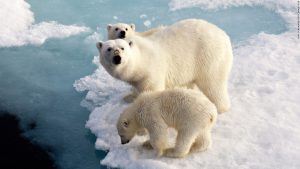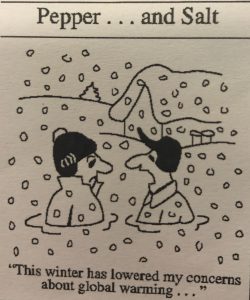This week, we covered Unit 3: Global Climate Change. 
Here are our answers for AE 4.
Question 1
Understanding Earth’s energy balance is essential to understanding the issue of global warming. For example, the solar energy striking Earth’s surface averages 168 watts per square meter (W/m2), but the energy leaving Earth’s surface averages 390 W/m^2. Why isn’t Earth cooling rapidly?
Although the energy leaving the Earth is greater than the energy absorbed by the Earth’s surface, the Earth does not cool rapidly as the atmosphere retains some of the energy emitted by the Earth’s surface.
Question 2 Decide and explain whether the statement is correct or incorrect. Explain.
Decide and explain whether the statement is correct or incorrect. Explain.
The statement is incorrect. The people in the cartoon are questioning why it is getting colder when everyone is concerned about global warming. They believe that the colder than usual winter is evidence to disprove global warming.
However, global warming is actually an increasingly concerning phenomenon. Not only has it led to extreme temperatures, it has also led to rising sea levels, increasing occurrences of droughts and hurricanes.
The main problem with this comic is that the people are confused between the terms “weather” and “climate”.
Weather is the day to day condition of the atmosphere. This includes temperature, rainfall and wind. Climate is the average weather conditions of a place, usually measured over one year.
Question 3
One of the first radar devices developed during World War II used microwave radiation of a specific wave range that triggers the rotation of water molecules. Why was the design not successful?
The radar device was designed to detect radiation reflected back onto the device. However, it did not work.
Microwave radiation has lower energy than infrared radiation. Water molecules can absorb microwave radiation and interfere with the detection of intended objects.
Question 4
Now that you have studies air quality (Unit 1), stratospheric ozone depletion (Unit 2), and global warming (Unit 3), which do you believe poses the most serious problem for you in the short run (pick one and explain)? In the long run (pick one and explain why)?
The most serious problem in the short term is the air quality. It directly affects the air we breathe and can cause respiratory problems.
In the long term, we have to worry about global warming. Melting ice caps and rising sea levels can lead to the submergence of many low-lying coastal regions such as Singapore. Global warming is not an immediate concern as it takes time for ice caps to melt and temperatures to rise before the Earth becomes inhabitable.
